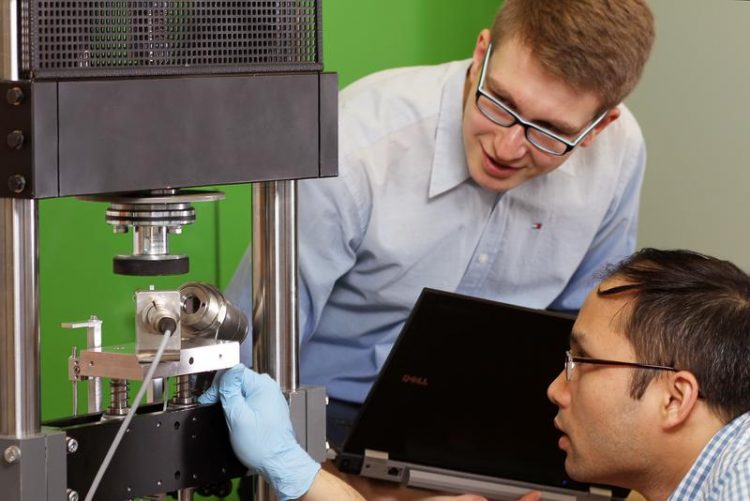Hanover Fair 2018: Custom plastics extend the lifespan of components

The researchers Nicholas Ecke (left) and his colleague Dong Hoa Vu are analysing the properties of the plastics produced in their own laboratories. Credit: TUK/Thomas Koziel
Plastics are often used in industrial applications, such as for all sorts of components in production machinery or vehicles. “It is often better than metal in these cases,” explains PhD student Nicholas Ecke, who is researching the properties of the material at the Chair of Composite Engineering under Prof Dr Alois Schlarb. “We are investigating the effect of friction, wear and lubrication, and exploring how to extend the material’s lifespan.” Experts refer to this field as tribology – the science of friction, wear and lubrication.
The engineers at Kaiserslautern are producing their own plastics and working on making them more resistant to friction and wear. “They consist of polymers which we augment with certain filler materials,” Ecke adds. What is special about this research is that the researchers are able to change the properties of the plastic and tailor it for the given application.
“For instance, carbon fibres help to strengthen the material and reduce abrasion,” the engineer continues. However, other materials can also be used; for example, tiny ceramic particles have a positive effect on the friction characteristics and also decrease wear. The researchers are also working on reactive plastics.
“Here, we incorporate various materials that are released, for example, when the temperature increases,” Ecke explains. “This includes water vapour that acts like an air cushion and reduces friction.” Moreover, the researchers are able to combine various filler material of different sizes.
The researchers assisting Ecke and his colleague, laboratory engineer Dong Hoa Vu, are analysing the properties of the plastics produced in their own laboratories. One of their testing machines is the pin-on-disc tribometer. A small right-angled pin is loaded into a holder, above which a metal disk is placed which lies directly against the pin. In this test rig, the disk can spin for several hours.
“We set the speed using a motor and the contact pressure of the disk using air pressure; the temperature can also be regulated,” Ecke elucidates. The device is equipped with sensors that measure the contact and friction pressure, while an infra-red sensor records the temperature. Using an optical distance meter, the researchers are able to measure the friction on the plastic sample directly.
“This technique allows us to recreate various conditions that components are exposed to in operation,” the engineer states. “The measurements help us to see how the plastic behaves.”
The researchers at the Chair of Composite Engineering on the Kaiserslautern campus are focused on analysing the fundamental properties of their materials, but they are also cooperating with industry partners to test how certain plastics behave in certain situations. They will be presenting their testing machines and plastics at the Hanover Fair.
For enquires:
Nicholas Ecke
Professorship for Composite Materials
Tel.: 0631 205-5753
Email: nicholas.ecke[at]mv.uni-kl.de
Media Contact
All latest news from the category: Trade Fair News
Newest articles

Innovative 3D printed scaffolds offer new hope for bone healing
Researchers at the Institute for Bioengineering of Catalonia have developed novel 3D printed PLA-CaP scaffolds that promote blood vessel formation, ensuring better healing and regeneration of bone tissue. Bone is…

The surprising role of gut infection in Alzheimer’s disease
ASU- and Banner Alzheimer’s Institute-led study implicates link between a common virus and the disease, which travels from the gut to the brain and may be a target for antiviral…

Molecular gardening: New enzymes discovered for protein modification pruning
How deubiquitinases USP53 and USP54 cleave long polyubiquitin chains and how the former is linked to liver disease in children. Deubiquitinases (DUBs) are enzymes used by cells to trim protein…



